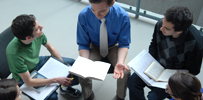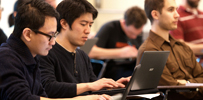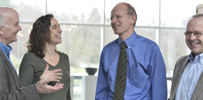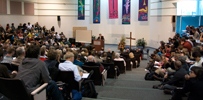The Passing of Harry Robinson
Harry S.D. Robinson was born in Toronto in 1927 and died on 4 April 2011 on Mayne Island, British Columbia. He was the son of John R. Robinson, a wealthy and prominent Toronto lawyer, and Elizabeth Marion (nee Boultbee). His grandfather was "Black Jack" Robinson, the editor of the Toronto Telegram for some thirty-five years. His mother was a devout Anglican; his Presbyterian father attended an Anglican church with his wife but never took communion, reflecting his Calvinist upbringing which had convinced him that he was not among the elect.
After completing his secondary schooling at the University of Toronto School, Harry Robinson became involved in the early camping ministry associated with the fledgling Inter-Varsity Christian Fellowship (IVCF) movement in Canada. At the age of 22 he began his university education, reading for a Bachelor of Arts degree in English and History at the University of Toronto. While an undergraduate he lived in residence at Wycliffe College, an evangelical Anglican seminary affiliated with the University of Toronto, and was deeply involved with IVCF in the student work on campus.
Upon his graduation in 1952 he studied in England for a year at Oak Hill Theological College, an Anglican seminary north of London. His lecturers included Derek Kidner, the renowned Old Testament scholar and Allan Stibbs; fellow students included Michael Baughan, later Bishop of Chester. During this time he met and befriended life-long associates: John R. W. Stott, then the remarkably young rector of All Soul's, Langham Place, in London; Dr. James I. Packer, then a budding Anglican theologian; and the Rev. Dick Lucas, long-time rector of St. Helen's, Bishopsgate, in London. In this way he became part of a growing international fellowship of Anglican Evangelical ministers who in the second half of the twentieth century did much to revive the fortunes of the evangelical grouping within the global Anglican communion.
In 1953 he returned to Toronto and enrolled in his second year of theological studies at Wycliffe College, graduating in 1955. In the same year he married Frances Adams, a nurse, who later trained and practiced family counselling. Together they had three daughters and one son.
He was ordained in 1955 and did a curacy in Kingston, Ontario before becoming rector of of the Church of the Redeemer in north Kingston. Here he was mentored by Canon (later Bishop) Desmond Hunt, then the widely respected rector of St. James, Kingston, a parish known for its student ministry. In 1963 he moved to Toronto to become rector of "Trinity East," better known as "Little Trinity," a slum parish near downtown Toronto with a long history of staunch "low churchmanship" and proud of its "hot Protestant" credentials. Under his leadership Little Trinity grew and developed a ministry to students, particularly students at the University of Toronto. Harry Robinson also became well known as a conference speaker and university missioner working closely with IVCF.
In 1978 a surprising turn of events occurred: Harry Robinson was offered the rectorship of St. John's Anglican Church in the Shaughnessy area of Vancouver. The church was located in one of Vancouver's wealthiest areas and had a history as a centre of High Churchmanship in British Columbia. In spite of its reputation St. John's was in serious decline and financial difficulty and its lay leaders were hopeful that Robinson could turn things around. Aid for the task came in 1979 when his old friend James Packer arrived in Vancouver to become professor of theology at Regent College as well as Harry Robinson's honorary assistant at the church. When Harry Robinson retired in 1992, St. John's was arguably attracting the largest number of Sunday congregants of any Anglican church in Canada.
Harry's success in parish ministry must undoubtedly be attributed to his genius as a preacher. While committed as a conservative evangelical, to the consecutive exposition of Scripture as the best way to build people up in the Christian faith, his highly original approach to the task reflected an innate creativity and an ability to use insightful narrative to disarm his listeners. Widely read and deeply culturally aware, his preaching combined piercing irony with deep spiritual insight and genuine humility.
In 1995 he was awarded an honorary doctorate by Wycliffe College, Toronto. In his retirement he gave himself to an itinerant ministry, and from 1996 to 2004 he served as the first chaplain to the fledgling Anglican Studies Program at Regent College, an evangelical graduate school in Vancouver. While unrecognized and unfeted by a largely hostile church bureaucracy, Robinson will undoubtedly be remembered as one of Canada's most influential Anglicans of the second half of the twentieth century. His younger brother, Tom (b. 1928), became a well-known evangelical Anglican minister in Atlantic Canada, founding Barnabas Anglican Ministries and played a key role in the establishment of the Anglican Essentials movement in Canada in the early 1990s.
Bishop Tony Burton, former bishop of Saskatchewan penned the following personal tribute to Harry Robinson:
“A gentle giant physically and morally, he combined a probing intuitive intelligence with an enormous love of people and focus on the Gospel task. He was a brilliant, original and unpredictable preacher and a perceptive critic of the interplay between the Gospel and contemporary culture. In the late 1970s, he was appointed Rector of St. John's, Vancouver, then a moribund, complacent small congregation, and at considerable personal cost set it on the path to becoming Canada's largest Anglican community, and one of its liveliest and most creative. As a churchman he built bridges and encouraged friendships across the country. In his heyday, he exercised an almost unrivaled degree of personal authority. A person of great warmth, charm and humility, he inspired and mentored countless vocations to the ordained ministry”
Donald M. Lewis, D.Phil. (Oxon.), F.R.H.S.
Professor of Church History, Regent College




